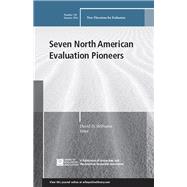How do people evaluate in daily life? This issue broaches this topic to better understand this dimension of being human, to develop evaluation theory, and to improve extraprofessional and professional evaluation practice. As part of a larger study addressing these issues in the lives of many professional evaluators around the world, case studies of seven early evaluation theorists and practitioners from North America were conducted. This issue contains articles with stories of some of their evaluation life experiences told and interpreted by these individuals, with commentary by an eighth evaluator. Themes that cross the cases are proposed, and responses by the individuals highlighted are shared in a final article.
This is the 150th issue in the New Directions for Evaluation series from Jossey-Bass. It is an official publication of the American Evaluation Association.








